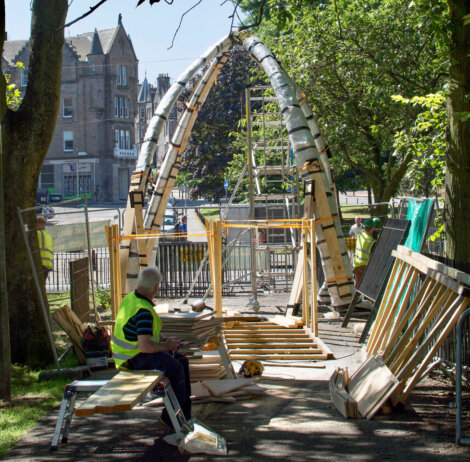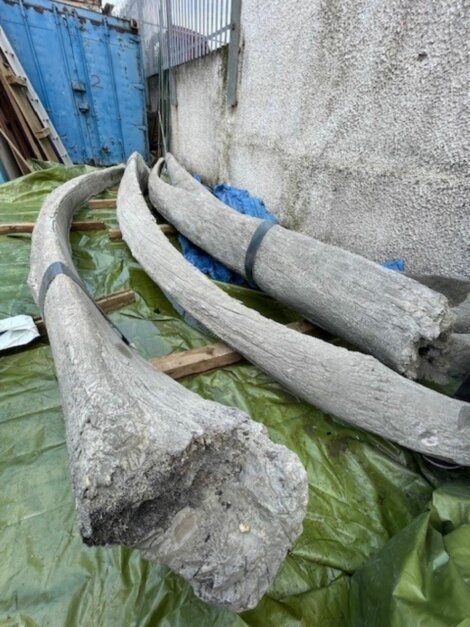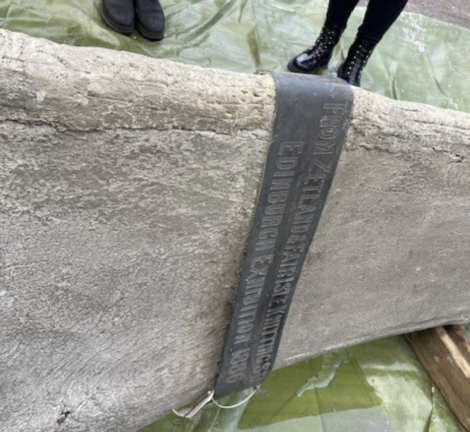History / Sculptor offers to help pay towards bringing Meadows whalebones to Shetland
A SCULPTOR with family links to a whalebone arch which was gifted from Shetland to Edinburgh in the late 1800s has offered to pay towards the cost of bringing the bones back north – if the city’s council gets rid of them.
Helen Pollock, who lives in New Zealand, said the four jaw bones – which are currently in storage in Edinburgh – would be a “magnificent exhibit” inside or outside a museum in Shetland.
But she has also offered to help the City of Edinburgh Council restore the bones in the first instance if it decides to reinstall them. However this appears to be unlikely.
An update on the fate of the historic bones will be given to an Edinburgh council meeting on Thursday (29 February).
A report to city councillors says officers will move to suggest installation of a jawbone arch interpretation panel at the site with – potentially – a surviving section included.
However no final decision on disposing the remainder of the bones will be actioned until concerns from Edinburgh World Heritage have been discussed in more detail.
The whale bones stood tall in an arch for more than a century at the Meadows in Edinburgh, forming a unique landmark at an entrance to the park – getting the nickname ‘jawbone walk’.
The bones formed part of a Shetland and Fair Isle Knitters stand at an international exhibition of science and art at the Meadows in 1886.
They were then gifted to the city by the knitters.
But in the mid-2010s the arch was taken down over safety fears, and last year Edinburgh councillors were told the condition of the bones was deteriorating further.
Become a member of Shetland News
The bones also have 25 centimetre wide bronze bands bearing the inscription The Zetland and Fair Isle Knitters Edinburgh Exhibition 1886.
There have been campaigns in the past to conserve the bones, including from the Edinburgh World Heritage organisation.
Pollock said she is a descendant of the Colvin family of Lerwick, with her late relatives running the old knitting business Schoor and Muir in the centre of town.
They coordinated the Shetland and Fair Isle knitters taking the four whale bones to the exhibition in Edinburgh in 1886, making a “tent like structure” to exhibit their knitting.
“They attracted the interest of international visitors, and buyers, including royalty, and they obtained Royal patronage for the knitters and the Schoor and Muir shop in Lerwick,” she explained.
Pollock said she has visited Val Walker, convener of Edinburgh city council’s culture and communities committee, to discuss options for the jaw jones.
She said she has offered her services as an experienced sculptor for their restoration, should the council decide to reinstall the jawbones.
Pollock has suggested coating the bones with a clear liquid epoxy resin, and using a framework of steel or bronze to support the structure.
However, she has also offered to make a “substantial donation” towards the cost of sending the bones to Shetland, and their installation, should they end being surplus to requirements in Edinburgh.
“They would be a magnificent exhibit inside or outside the Shetland Museum, or one of the other smaller Shetland museums, and the story associated with them is very much of interest and relevance to locals and visitors,” Pollock said.
A report on the arch went in front of Edinburgh councillors in August last year, which made for fairly grim reading regarding the fate of the bones.
It suggested the bones be disposed of, with cross-section pieces potentially kept in museum collections, while a bronze replica structure could be installed as a replacement.
The report to councillors also said there had been interest from artists in using part of the bones, including from Scottish artist and sculptor Will Maclean.
The end result of that meeting was to dispose of the existing jawbones which are deemed unviable for suitable public display – but to continue to explore creative conservation solutions until October 2023.
Councillors had also agreed to contact art organisations regarding the potential re-use of jawbone as an art medium.
An update on the project is going to an Edinburgh council meeting this Thursday.
It said: “Officers have researched, within reason, opportunities for relocation and found no interested parties.
“This is a reflection of the state of the jawbones and ongoing responsibilities required for safe display and maintenance.
“The recommendation to explore alternative use by artists also hit a buffer as the whale jawbones are classified as hunted species and therefore protected – artists would not be allowed to sell any work containing such material.
“Further dialogue is required with Edinburgh World Heritage which is opposed to the report findings and recommendation, and no final disposal decision will be actioned until those concerns have been discussed in more detail.
“Response from the local community has been muted. There was little appetite for a replacement as recommended in the report, and officers will move to suggest the installation of a jawbone arch interpretation panel with (potentially) a surviving section.”
This is being presented to councillors as information, as it appears no decisions are being taken on Thursday.
Become a member of Shetland News
Shetland News is asking its many readers to consider paying for membership to get additional features and services: -
- Remove non-local ads;
- Bookmark posts to read later;
- Exclusive curated weekly newsletter;
- Hide membership messages;
- Comments open for discussion.
If you appreciate what we do and feel strongly about impartial local journalism, then please become a member of Shetland News by either making a single payment, or setting up a monthly, quarterly or yearly subscription.
































































